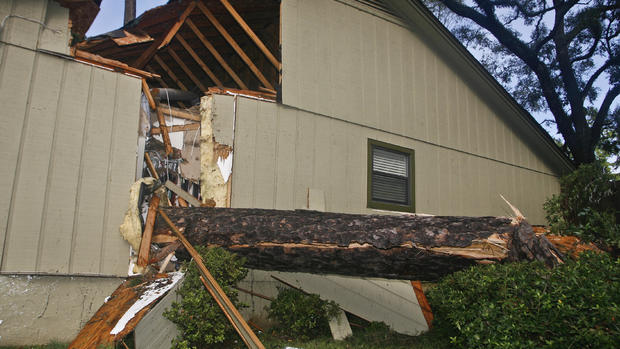As Hermine wreaks havoc, is your home protected?
Hermine, the first hurricane to hit the shores of Florida in more than a decade, hit the state with wind speeds of over 80 mph, heavy rains, and caused thousands of power outages. One death has been linked to the storm so far.
Hermine has been downgraded to a tropical storm and has moved through Georgia and is on its way to the Carolinas, and is a threat to hundreds of thousands of homes in its path up the East Coast.
If your home is in the path of Hermine, or the next significant storm, there are a few common-sense things you can do to protect it and limit the damage.
Here’s a few things you can do that are recommended by property insurance and disaster relief experts:
- Prepare for damage caused by high winds. Look around the outside of your home and secure lawn furniture, umbrellas, hanging bird feeders, etc. Left unsecured, these items could act like missiles during high winds brought by rapidly moving storms. Move these things indoors if you have the room, or tie them down.
- If you have trees around your house, take a look for large branches that overhang your home. If there’s time to call a tree service company to have these removed, then get on it.
- Severe storms can often cause power outages. Make preparations for the loss of electrical power that can last a few hours or even up to a few days. Have a cooler ready with some ice to use in case you need to preserve the food in your refrigerator.
- Have an adequate supply of drinking water on hand in case your source of potable water is disrupted.
- If you have a portable generator, get it ready for service. Test run the generator, add fresh fuel, and get extra fuel.
- Use caution to use portable generators only outside in well ventilated places as the exhaust from these in enclosed spaces -- like a garage -- can result in a deadly build-up of toxic exhaust, which can kill you.
- And of course, stock up on emergency supplies, such as batteries, food, and blankets.
Now’s also good time to make sure any possible losses caused by a severe storm are covered by having adequate property insurance. Take a few minutes to review your home insurance policy to see if your home is adequately covered.
If you haven’t reviewed your home insurance policy in a few years, then pull it out and read the policy coverage summary. Think about how the limits in your policy would apply if you experienced significant damage to your home. If you aren’t sure about your coverage, then call your agent or insurance company and review the policy with them.
Use the time reviewing your policy with your agent or insurance company to get answers to questions about what’s covered and how much the insurance will pay when your home and contents are damaged by a storm that brings high winds and significant rains. You might find that a flooded basement may be covered if your sump pump failed due to loss of electrical power. But if the basement was flooded due to rising waters from a nearby river or stream, then that may be considered flood damage.
What every homeowner needs to know is this simple fact: a standard home insurance policy does not cover flood damage. While most home insurance policies include “multi-peril” coverage, flooding isn’t one of those.
If your home is at an elevation where flooding is impossible, then you probably don’t need flood insurance. But even if it’s not located in a designated high-flood-risk area, you should still consider this special insurance. Here’s why: more areas than you think are susceptible to flooding. Recently I wrote about flood insurance and that nearly a quarter of all claims covered under the National Flood Insurance Program come from homes located outside a high-flood-risk area. Most folks can buy flood insurance through their insurance agent or existing insurance company. The average annual cost of a flood insurance policy is about $650.

